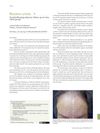 October 2024 in “Journal of Education Health and Sport”
October 2024 in “Journal of Education Health and Sport” Alopecia areata treatment should be personalized, using topical or systemic therapies based on severity, with promising options like JAK inhibitors needing more research.
 May 2024 in “Journal of Education, Health and Sport”
May 2024 in “Journal of Education, Health and Sport” Current treatments for folliculitis decalvans include antibiotics, isotretinoin, and potential new therapies like botulinum toxin A and PRP.
 April 2024 in “International Journal of Research Publication and Reviews”
April 2024 in “International Journal of Research Publication and Reviews” Alopecia areata causes hair loss with varied treatment responses and frequent relapses.
 February 2024 in “PloS one”
February 2024 in “PloS one” Tofacitinib and adalimumab are promising treatments for cicatricial alopecia with few side effects.
 January 2024 in “GeroScience”
January 2024 in “GeroScience” Using radiation to make mice's hair turn gray helps study and find ways to prevent or reverse hair graying.
 October 2023 in “Dermatology practical & conceptual”
October 2023 in “Dermatology practical & conceptual” Pulse corticosteroids help regrow hair in alopecia areata but have side effects, especially betamethasone.
 October 2023 in “Frontiers in medicine”
October 2023 in “Frontiers in medicine” Comprehensive screening for infections is crucial before starting JAK inhibitors in alopecia areata patients.
 July 2023 in “The Egyptian Journal of Hospital Medicine ”
July 2023 in “The Egyptian Journal of Hospital Medicine ” The conclusion is that emotional support and a variety of treatments are important for alopecia areata, but more research is needed.
 July 2023 in “The Egyptian Journal of Hospital Medicine ”
July 2023 in “The Egyptian Journal of Hospital Medicine ” Alopecia areata is a hair loss condition caused by immune factors and can be treated with JAK inhibitors.
 May 2023 in “Bali Medical Journal”
May 2023 in “Bali Medical Journal” Higher sebum levels are linked to more severe male baldness.
 April 2023 in “IP Indian journal of clinical and experimental dermatology”
April 2023 in “IP Indian journal of clinical and experimental dermatology” Lichen planus is a chronic autoimmune disease that is hard to treat and more common in women.

Higher TGF-β signaling may increase skin cancer risk in organ transplant recipients.

Liquid nitrogen cryotherapy worked well for many patients with stubborn alopecia areata.
 March 2023 in “Clinical, cosmetic and investigational dermatology”
March 2023 in “Clinical, cosmetic and investigational dermatology” IL-33 is linked to hair follicle damage in psoriasis and could be a treatment target for hair loss in this condition.
 November 2021 in “Research, Society and Development”
November 2021 in “Research, Society and Development” Individualized treatment and psychological support are crucial for alopecia.
 February 2021 in “Journal of pharmaceutical and biological sciences”
February 2021 in “Journal of pharmaceutical and biological sciences” No cure exists for alopecia areata, and treatments are personalized.
 February 2021 in “Journal of nursing education and practice”
February 2021 in “Journal of nursing education and practice” Women and men experience different quality of life and symptom distress after kidney transplant with immunosuppressive therapy.
 January 2020 in “Der Pharmacia Lettre”
January 2020 in “Der Pharmacia Lettre” Nanoparticle-based herbal remedies could be promising for treating hair loss with fewer side effects and lower cost, but more research is needed.
 May 2019 in “Anais brasileiros de dermatologia/Anais Brasileiros de Dermatologia”
May 2019 in “Anais brasileiros de dermatologia/Anais Brasileiros de Dermatologia” Frontal fibrosing alopecia mostly affects postmenopausal women, with diagnosis often delayed by 3 years.
 January 2019 in “Przegląd Dermatologiczny”
January 2019 in “Przegląd Dermatologiczny” An 87-year-old woman was diagnosed with type 3 autoimmune polyendocrine syndrome and had multiple autoimmune issues.
 January 2019 in “Springer eBooks”
January 2019 in “Springer eBooks” Acne is linked to inflammation and insulin resistance, and is associated with various syndromes that require different treatments.
 September 2018 in “Cosmetics”
September 2018 in “Cosmetics” Inositol and arginine solutions improve hair follicle health and turnover.
 January 2018 in “SOJ microbiology & infectious diseases”
January 2018 in “SOJ microbiology & infectious diseases” Etanercept, a psoriasis treatment, caused hair loss in a patient.
 January 2018 in “Elsevier eBooks”
January 2018 in “Elsevier eBooks” The document concludes that alopecia has significant social and psychological effects, leading to a market for hair loss treatments.
 January 2018 in “Clinical dermatology open access journal”
January 2018 in “Clinical dermatology open access journal” The Biofield Energy Treated herbal mixture increased hair growth in mice compared to the untreated mixture.
 December 2017 in “Springer eBooks”
December 2017 in “Springer eBooks” Transplant patients often get skin problems, with treatments varying by condition.
 June 2017 in “Journal of clinical and investigative dermatology”
June 2017 in “Journal of clinical and investigative dermatology” Red blood cell folate levels are reliable indicators of long-term folate status in alopecia areata patients.
 July 2016 in “American Journal of Dermatopathology”
July 2016 in “American Journal of Dermatopathology” The meeting showcased rare skin disease cases, highlighting the need for accurate diagnosis and treatment.
 February 2016 in “Acta Medica Marisiensis”
February 2016 in “Acta Medica Marisiensis” A woman with chronic hepatitis C had a rare skin condition linked to her illness.
 January 2016 in “Springer eBooks”
January 2016 in “Springer eBooks” Alopecia Areata is an unpredictable autoimmune hair loss condition with limited and variable treatment effectiveness.





























